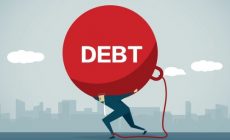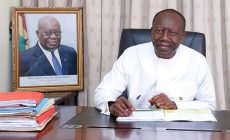Ghana’s public debt hits GH¢119.9b
- Posted on
- Comment
 GHANA’S public debt has hit GH¢119.9billion as at the end of November 2016, the Bank of Ghana (BoG) has said.
GHANA’S public debt has hit GH¢119.9billion as at the end of November 2016, the Bank of Ghana (BoG) has said.
As a per centage of Gross Domestic Products (GDP), GH¢119.9billion represents 71.9% of GDP.
These were contained in the Summary of Economic and Financial Data of the BoG published last Friday.
The total public debt as at October 2016 was GH¢114.9billion representing 68.9% of GDP.
The new figures show that the public debt rose by GH¢5 billion in one month-that is from October to November 2016.
External debt accounted for GH¢66billion of the debt representing 39.6% of GDP while domestic debt accounts for GH¢53.9 billion, representing 32.3 % of GDP.
Ghana’s 71.9% debt to GDP too high-IMF
During a two-day official visit to Ghana, the Deputy Managing Director of the IMF, Mr Min Zhu, described Ghana’s public debt as extremely high and cautioned government against further borrowing to pay interest on its loans.
“The debt level is still high, compared with its peers, around 70% of GDP. “For all its peers, whether emerging markets or frontier markets, they are around 40-45%.
“So the debt ratio is very high. Debt sustainability is one of the key issues. When you have a high debt ratio, then the market will be concerned. Meanwhile, it will be extremely difficult for you to go back to the market. This is a key challenge,” he said.
According to him, Ghana’s debt to Gross Domestic Products (GDP) of 70% is extremely high among lower middle income countries in the world.
Mr Zhu said the extremely high debt to GDP was responsible for high inflation and high interest rates in the country, warning that any further fiscal slippages would make things worse.
He explained that reducing the country’s debt of 70% to GDP was critical to bringing down inflation and interest rates to boost the private sector.
Government’s borrowing to finance large budget deficits in recent years have been one of the major factors that have caused interest rates in the country to rise significantly, increasing the cost of borrowing.
8% budget deficit for 2016
The new government says the budget deficit stood at around 8 percent at the end of 2016, higher than the 5.3 percent targeted under the programme.
As its borrowing increases, the government has to pay higher interest rates to the holders of its bonds.
In Ghana’s case, increased borrowing by the government has pushed up interest rates because the market fears that there is a high chance of default on the part of the government; therefore, it demands higher interest rates in return for the greater risk.
Interest costs have risen astronomically in recent years in Ghana due to the large budget deficits registered over the years, especially since 2012, which were financed by borrowed funds from both domestic and foreign sources at high interest rates.
By Elvis DARKO, Accra










 (Selorm) |
(Selorm) |  (Nana Kwesi)
(Nana Kwesi)